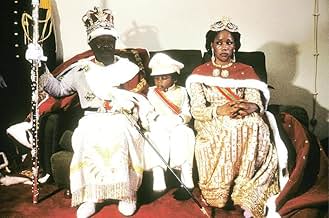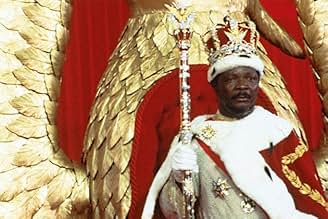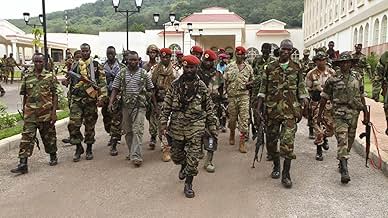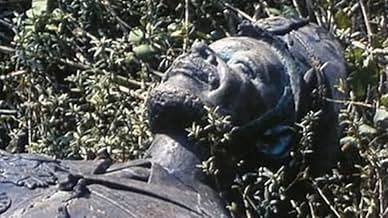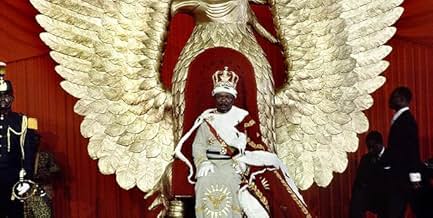Ajouter une intrigue dans votre langueDocumentary examining Bokassa's rule in the Central African Republic using the testimony of witnesses and visits to key sites.Documentary examining Bokassa's rule in the Central African Republic using the testimony of witnesses and visits to key sites.Documentary examining Bokassa's rule in the Central African Republic using the testimony of witnesses and visits to key sites.
- Prix
- 1 victoire au total
Histoire
Le saviez-vous
- ConnexionsFeatured in Filmstunde: Filmstunde 2 (1992)
- Bandes originalesFour Pieces for Orchestra Op. 12
Composed by Béla Bartók
Commentaire en vedette
It's a terrible truth of western sensibilities that world events and history outside the direct and immediate sphere of influence usually go entirely unremarked. I'm sure I'm not the only person who, owing to the lack of meaningfully broad education, has upon exploring the films of Werner Herzog learned for the first time of Jean-Bédel Bokassa and his crimes. The story of Bokassa is one that has played out across the world over and over again, especially in places where western imperialism has left countries in ruin, but as the past few years have urgently demonstrated not even the United States is safe from despots. 'Echoes from a somber empire' paints a familiar portrait of a figure who was egotistical, narcissistic, hypocritical, and paranoid, not to mention cruel; attitudes and policies characterized by corruption, opulence, and ridiculous personal gratification on one level, all superseded on another by brutal violence, sociopolitical repression, and the codification and enforcement of strict and senseless morality; and among still other matters, denial of wrongdoing that also attempts to deflect blame onto others. It would be very easy for a documentary exploring such a person, and such a time and place, to become a simple recitation of all wrongdoing, with horrid descriptions. Herzog takes another approach, however, and as he does this film stands apart from other that may broach similar subject matter.
In his pictures both fiction and non-fiction, Herzog excels at examining humanity - good, bad, and everything in between - with the same dispassionate detachment as with which one may capture footage of a leopard mauling an antelope. Here that objectivity is turned to some degree toward showing us the complexities of an individual who was responsible for egregious violations of human rights and loss of life. The difference is that for whatever recounting we get of specific actions, including footage of Bokassa's lavish and frivolous spending, the majority of 'Echoes' is spent giving viewers an impression of his rule through the recollections of lived experiences of those around or under him. In this regard Herzog's feature is a bit indirect, but that's just the point: sensational tales of authoritarians' foul deeds tend to overshadow the stories of countless more ordinary people who are affected by those deeds, but who are no less deserving of remembrance. With this in mind, there are only so many people who can be interviewed for a 90 minute documentary, and so much information that can be conveyed therein, so one may reasonably argue that 'Echoes' comes up short in not truly giving a complete picture of Bokassa and his rule, and in some sense minimizing what he did or oversaw. Still, the unusual tack of this movie is noteworthy for diverging from what in this genre passes for convention, and in somewhat deemphasizing and skirting around the primary subject to speak of others whose stories would otherwise be lost to time.
Herzog and his crew follow journalist Michael Goldsmith as he, and not the filmmaker, revisits certain key sites, and converses with key persons. Interspersed with this is footage of Bokassa from the hopeless self-absorption and pomposity of his coronation, or from his trials, as well as still photos. We get a clear idea of who Bokassa was, but always 'Echoes' is mindful enough not to plainly exhibit the utmost indifference toward humanity that the "emperor" embodied. To that end, I suppose it's fair to argue that the film treats Bokassa too lightly, but I think the point is made nonetheless. And it's all capped off with a sad, unforgettable closing shot that seems superficially out of place, yet which in its own unique way serves to accentuate the grotesque madness that enveloped the Central African Republic under the man's reign. For one reason or another I can certainly appreciate that this movie won't appeal to all comers, and the topic alone may be worthy of a content warning. However, for anyone in an interest in documentaries or world history generally, or in the works of Werner Herzog specifically, 'Echoes from a somber empire' is another finely crafted piece of non-fiction that is well worth checking out if one has the chance.
In his pictures both fiction and non-fiction, Herzog excels at examining humanity - good, bad, and everything in between - with the same dispassionate detachment as with which one may capture footage of a leopard mauling an antelope. Here that objectivity is turned to some degree toward showing us the complexities of an individual who was responsible for egregious violations of human rights and loss of life. The difference is that for whatever recounting we get of specific actions, including footage of Bokassa's lavish and frivolous spending, the majority of 'Echoes' is spent giving viewers an impression of his rule through the recollections of lived experiences of those around or under him. In this regard Herzog's feature is a bit indirect, but that's just the point: sensational tales of authoritarians' foul deeds tend to overshadow the stories of countless more ordinary people who are affected by those deeds, but who are no less deserving of remembrance. With this in mind, there are only so many people who can be interviewed for a 90 minute documentary, and so much information that can be conveyed therein, so one may reasonably argue that 'Echoes' comes up short in not truly giving a complete picture of Bokassa and his rule, and in some sense minimizing what he did or oversaw. Still, the unusual tack of this movie is noteworthy for diverging from what in this genre passes for convention, and in somewhat deemphasizing and skirting around the primary subject to speak of others whose stories would otherwise be lost to time.
Herzog and his crew follow journalist Michael Goldsmith as he, and not the filmmaker, revisits certain key sites, and converses with key persons. Interspersed with this is footage of Bokassa from the hopeless self-absorption and pomposity of his coronation, or from his trials, as well as still photos. We get a clear idea of who Bokassa was, but always 'Echoes' is mindful enough not to plainly exhibit the utmost indifference toward humanity that the "emperor" embodied. To that end, I suppose it's fair to argue that the film treats Bokassa too lightly, but I think the point is made nonetheless. And it's all capped off with a sad, unforgettable closing shot that seems superficially out of place, yet which in its own unique way serves to accentuate the grotesque madness that enveloped the Central African Republic under the man's reign. For one reason or another I can certainly appreciate that this movie won't appeal to all comers, and the topic alone may be worthy of a content warning. However, for anyone in an interest in documentaries or world history generally, or in the works of Werner Herzog specifically, 'Echoes from a somber empire' is another finely crafted piece of non-fiction that is well worth checking out if one has the chance.
- I_Ailurophile
- 11 août 2022
- Lien permanent
Meilleurs choix
Connectez-vous pour évaluer et surveiller les recommandations personnalisées
Détails
Contribuer à cette page
Suggérer une modification ou ajouter du contenu manquant

Lacune principale
By what name was Echos aus einem düsteren Reich (1990) officially released in India in English?
Répondre
